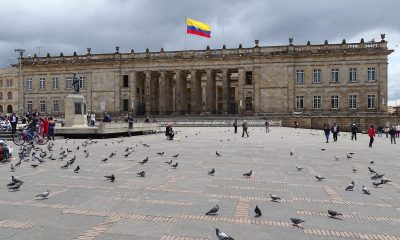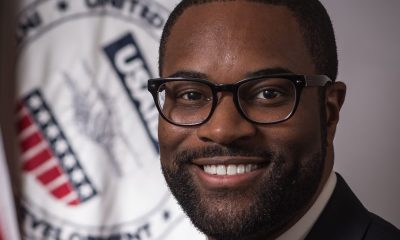World
USAID seeks to bolster LGBTQ rights efforts in Colombia
LGBTQ-inclusive peace agreement took effect in 2016
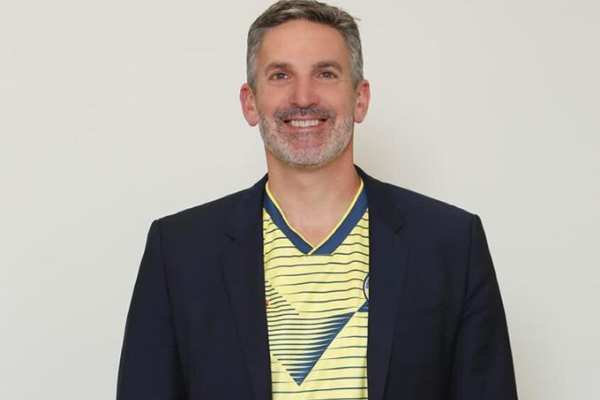
BOGOTÁ, Colombia — The director of the U.S. Agency for International Development’s Colombia mission says he and his colleagues remain committed to the implementation of the country’s LGBTQ-inclusive peace agreement.
“The entire portfolio that we have and all of our work here in Colombia is really to support a durable and an inclusive piece,” Larry Sacks told the Washington Blade on Sept. 21 during an interview in Bogotá, the Colombian capital. “The core principles of what we do are based on equality, inclusion, rights and justice.”
The agreement then-President Juan Manuel Santos and the Revolutionary Armed Forces of Colombia Commander Rodrigo “Timochenko” Londoño signed in Cartagena on Sept. 26, 2016, specifically acknowledged LGBTQ Colombians as victims of the decades-long conflict that killed more than 200,000 people. The accord also called for their participation in the country’s political process.
Wilson Castañeda, director of Caribe Afirmativo, an LGBTQ group in northern Colombia with which USAID works, is one of three activists who participated in the peace talks that took place in Havana.
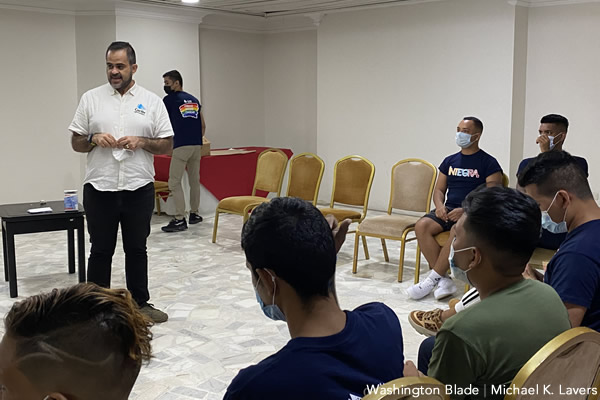
Colombian voters on Oct. 2, 2016, narrowly rejected the agreement in a referendum that took place against the backdrop of anti-LGBTQ rhetoric from religious and conservative groups. Santos and Londoño less than two months later signed a second peace agreement — which also contains LGBTQ-specific references — in Bogotá.
“That was a very progressive move,” said Sacks in describing the inclusion of LGBTQ Colombians in the agreement.
President Iván Duque, who campaigned against the agreement ahead of his 2018 election, spoke to the U.N. General Assembly hours before the Blade interviewed Sacks. Duque described it as “fragile.”
“Peace accords worldwide tend to be made or broken within the first five years of implementation, and Colombia is right at that point,” Sacks told the Blade when asked about Duque’s comments. “There are certain people deep in the territories and others and high governments who are really helping and making sure that it’s successful, and that there’s continuity, and that the gains that have been made are irreversible. And there’s others who may question, but at the end of the day, I think that from our analysis, it’s on pace with what we’ve seen of the implementation of other peace accords worldwide.”
“At least from USAID’s perspective, we’re doing everything that we can to help support the implementation on multiple chapters of the peace accord,” he added.
USAID specifically supports the implementation of rural development programs through the agreement, efforts to reintegrate former child soldiers into Colombian society and expand the government’s presence into “violence-affected areas.” USAID also works with the Truth Commission, the Unit for the Search of Disappeared Persons, the Special Jurisdiction for Peace, the government’s Victims’ Unit and NGOs that support the conflict’s victims.
USAID’s fiscal year 2021 budget for Colombia is $212.9 million. Upwards of $50 million of this money is earmarked for human rights work that specifically focuses on indigenous Colombians and Colombians of African descent, security, access to the country’s justice system and victims of the conflict.
More than 200 LGBTQ Colombians reported murdered in 2020
Sacks said USAID’s LGBTQ-specific work in Colombia focuses on four specific areas.
“The first is really to kind of shine a light on, raise the visibility, raise the profile on issues of discrimination and violence and stigma and all the issues that this population is facing,” he said.
Colombia Diversa, a Colombian LGBTQ rights group, on Sept. 15 issued a report that notes 226 LGBTQ people were reported murdered in the country in 2020. This figure is more than twice the number of LGBTQ Colombians — 107 — who Colombia Diversa said were known to have been killed in 2019.
Sacks acknowledged anti-LGBTQ violence is increasing in Colombia.
He said the mission works with Ombudsman’s Office of Colombia, an independent agency within the Colombian government that oversees human rights protections in the country, to provide additional support to LGBTQ rights groups. Sacks noted USAID also works with the Interior Ministry to “support the development of their LGBTQI-plus policies” and the country’s attorney general “to hold those accountable.”
Sacks told the Blade that USAID also works to provide “technical and legal support to help” LGBTQ Colombians and other vulnerable groups “access public goods, services and justice.”
USAID-supported groups assist Venezuelan migrants
The Colombian government earlier this year said there were more than 1.7 million Venezuelan migrants in the country, although activists and HIV/AIDS service providers with whom the Blade has spoken say this figure is likely much higher. Duque in February announced it would legally recognize Venezuelan migrants who are registered with the country’s government.
The Coordination Platform for Migrants and Refugees from Venezuela notes upwards of 5.4 million Venezuelans have left the country as of November 2020 as its economic and political crisis grows worse. The majority of them have sought refuge in Colombia, Brazil, Ecuador, Peru and Chile.
Venezuelan migrants are among the upwards of 570,000 people who have benefitted from a USAID program that provides direct cash assistance — between $49-$95 per family — for six months in order to purchase food and other basic needs. USAID also supports Americares, a Connecticut-based NGO that operates several clinics along the Colombia-Venezuelan border and in northern Colombia that specifically serve Venezuelan migrants with the support of the Colombian Health Ministry.
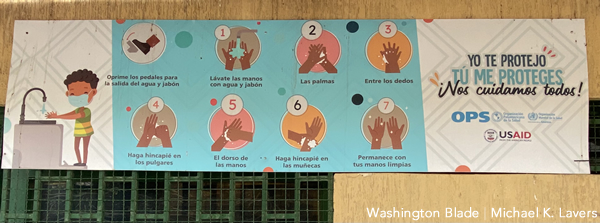
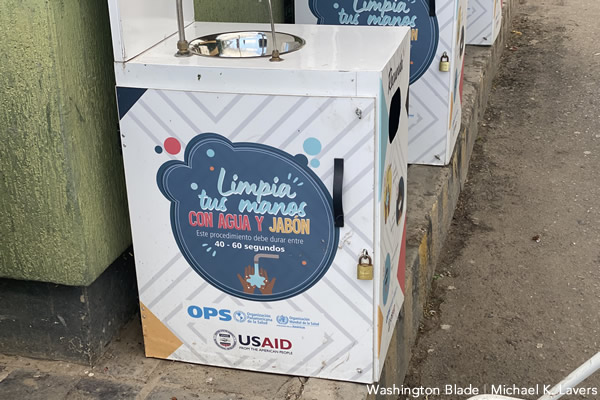
Sacks noted USAID has an “agreement with” Aid for AIDS International, a New York-based group that serves Venezuelans with HIV/AIDS. Aid for AIDS International has used this support to conduct a survey of 300 sex workers in Maicao, Medellín and Cali.
USAID is also working with the Health Ministry to provide health care to Venezuelan migrants with HIV/AIDS, among others, who are now legally recognized in Colombia.
Caribe Afirmativo has opened three “Casas Afirmativos” in Maicao, Barranquilla and Medellín that provide access to health care and other services to Venezuelan migrants who are LGBTQ and/or living with HIV/AIDS. Medellín officials have also invited Caribe Afirmativo staffers to speak with LGBTQ migrants in the city’s public schools.
“Colombia has shown a generosity that you don’t see in many other countries with regard to migrant populations,” Sacks told the Blade. “They really open their borders, their homes, their hearts, to migrants, including the LGBTI community.”
Biden global LGBTQ rights memo is ‘tremendous benefit’
The White House earlier this year released a memorandum that committed the U.S. to promoting LGBTQ rights abroad. State Department spokesperson Ned Price in May told the Blade the protection of LGBTQ migrants and asylum seekers is one of the Biden administration’s priorities on this front.
Sacks said the memo “gives us the political framework with which to operate and obviously sends a message from the highest levels of the U.S. government about LGBTQI-plus rights and equality and inclusion.”
“So for us, it’s a tremendous benefit,” he told the Blade.
USAID Administrator Samantha Power — a vocal champion of LGBTQ rights — has yet to visit Colombia, but Sacks said she has spoken with Vice President Marta Lucía Ramírez.
“We hope to get her down,” said Sacks.
Editor’s note: Michael K. Lavers was on assignment in Colombia from Sept. 11-22.
European Union
Activists demand EU sanction Uganda over Anti-Homosexuality Act
Yoweri Museveni signed law on May 29, 2023
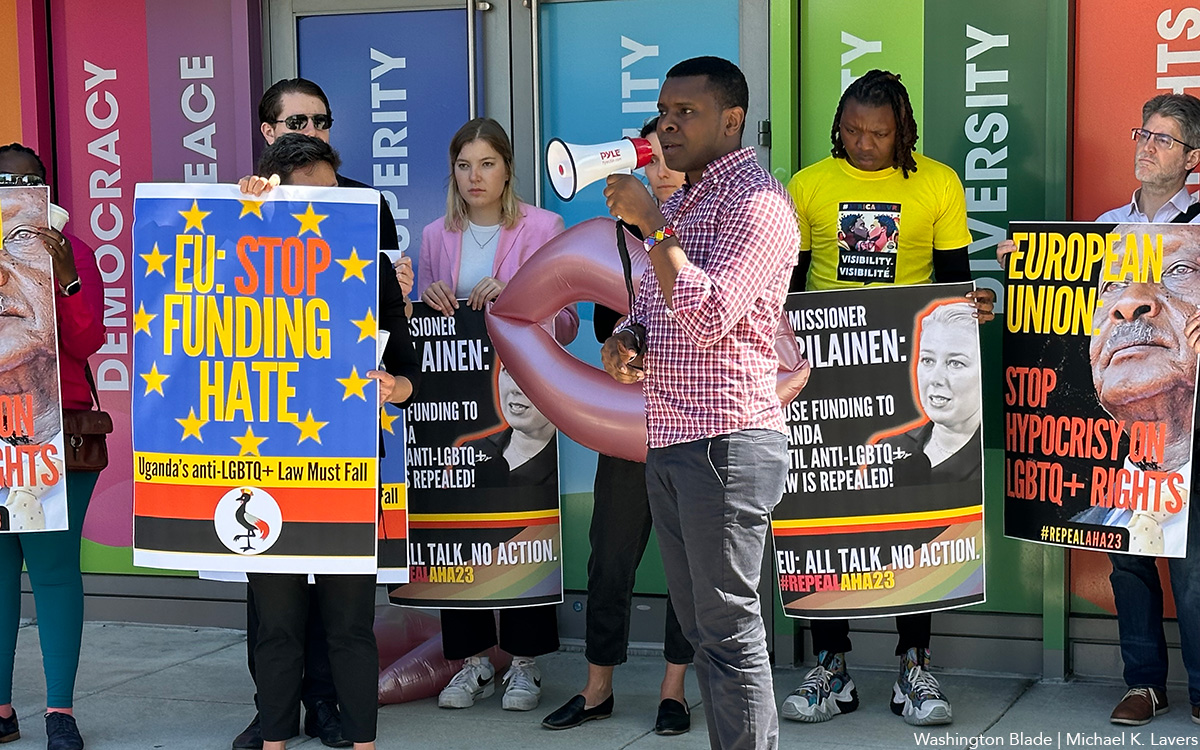
More than a dozen activists who protested in front of the European Union Delegation to the United States in D.C. on Thursday demanded the EU to sanction Uganda over the country’s Anti-Homosexuality Act.
Hillary Innocent Taylor Seguya, a Ugandan LGBTQ activist, and Global Black Gay Men Connect Executive Director Micheal Ighodaro are among those who spoke at the protest. Health GAP Executive Director Asia Russell also participated in the event that her organization organized along with GBGMC and Convening for Equality Uganda, a Ugandan LGBTQ rights group.
Ugandan President Yoweri Museveni last May signed the Anti-Homosexuality Act that, among other things, contains a death penalty provision for “aggravated homosexuality.”
The country’s Constitutional Court on April 3 refused to “nullify the Anti-Homosexuality Act in its totality.” A group of Ugandan LGBTQ activists have appealed the ruling.
A press release that Health GAP issued ahead of Thursday’s protest notes EU Commissioner for International Partnerships Jutta Urpilainen on March 6 announced more than €200 million ($212.87 million) for Uganda in support of “small business owners, young female entrepreneurs, agribusinesses as well as vital digital infrastructure projects in full Team Europe format with the European Investment Bank (EIB) and several member states.”
“These concrete initiatives will make a difference to aspiring entrepreneurs, Ugandan businesses and create jobs in multiple sectors,” said Urpilainen in a press release that announced the funds. “This is a perfect example of how Global Gateway can make a tangible difference for citizens and businesses and unlock the full potential of a partner country by working together.”
Convening for Equality Uganda on Tuesday in a letter they sent to Urpilainen asked the EU to review all funding to Uganda and “pause or reprogram any funds that go via government entities.” The protesters on Thursday also demanded European Commission President Ursula von der Leyen “to hold Ugandan President Museveni’s government accountable for this attack on human rights.”
Josep Borrell, the EU’s top diplomat, in a statement he released after Museveni signed the Anti-Homosexuality Act said the law “is contrary to international human rights law and to Uganda’s obligations under the African Charter on Human and People’s Rights, including commitments on dignity and nondiscrimination, and the prohibition of cruel, inhuman or degrading punishment.”
“The Ugandan government has an obligation to protect all of its citizens and uphold their basic rights,” said Borrell. “Failure to do so will undermine relationships with international partners.”
“The European Union will continue to engage with the Ugandan authorities and civil society to ensure that all individuals, regardless of their sexual orientation and gender identity, are treated equally, with dignity and respect,” he added.
Urpilainen last September in a letter to the European Parliament said the EU would not suspend aid to Uganda over the law.
India
Indian political parties for the first time include LGBTQ rights in election platforms
Voters will begin to cast ballots on April 19

The world’s largest democratic exercise will begin in India on April 19 as citizens begin to cast their votes in the country’s election.
This year’s election is different because national level political parties for the first time are promising to extend marriage rights to same-sex couples as part of their election platforms.
The Indian National Congress, one of India’s oldest political parties, promised after wide consultation that it would introduce a bill that would recognize civil unions between couples who are part of the LGBTQ community. The party, which has governed India for the majority of the period since independence from the U.K. in 1947, has refrained from taking a stance on laws that include Section 377, which criminalized consensual same-sex sexual relations.
Then-Health Minister Gulam Nabi Azad in 2011 when the INC was in power said homosexuality is a disease. He made the controversial comment while speaking at an HIV/AIDS conference in New Delhi, the Indian capital.
“Unfortunately, this disease has come to our country too,” said Azad. “Where a man has sex with another man, which is completely unnatural and should not happen but does.”
When the Delhi High Court was hearing the Naz Foundation case, the Home Affairs Ministry opposed the striking down of Section 377 based on its belief that homosexuality cannot be morally condoned. The INC never struck down Section 377, which criminalized homosexuality, in parliament.
A 5-judge panel on the Supreme Court on Sept. 6, 2018, decriminalized consensual same-sex sexual relations.
The Communist Party of India (Marxist) on April 4 unveiled its platform with a range of socialist commitments, including support for LGBTQ rights. Among these pledges is to amend the Transgender Persons (Protection of Rights) Act 2019 to address community concerns and ensure legal recognition and protection for same-sex couples akin to marriage.
The platform also outlined plans to introduce a bill similar to the Special Marriage Act of 1954, which allows partners to be listed as dependents and facilitating like inheritance, alimony in the event of divorce and other issues. The party further pledged to enact a comprehensive anti-discriminatory bill that would include LGBTQ people, ensure quotas in educational institutions and implement horizontal reservations in employment.
Addressing the issue of crimes against LGBTQ people, the platform promised to treat such offenses on par with crimes against heterosexuals. The platform also calls for tackling bullying, violence and harassment of gender non-conforming and LGBTQ people in educational settings, enforcing anti-hazing policies and combating hazing based on sexual orientation and gender identity.
The platform further touched issues related to transition and informed consent.
The Special Marriage Act of 1954 is a law that provides for civil unions among Indians and Indian nationals who live abroad, regardless of the religion or faith followed by either party. This law enables people from two different religious backgrounds to enter into marriage. Parliament in 2019 passed the Transgender Persons (Protection of Rights) Act that extended rights to trans people.
Brinda Karat, a former member of the Rajya Sabha, the upper house of the Indian Parliament, and leader of the Communist Party of India (Marxist), spoke with the Washington Blade and said the current government has homophobic ideas that are not acceptable to the party.
The ruling government under Prime Minister Narendra Modi is striving to secure more than 400 parliament seats in the upcoming election, aiming for a substantial majority.
Various polls conducted by Indian news organizations indicate a probable victory for the ruling Bharatiya Janata Party. In response to the BJP’s dominance, Congress and several national and regional parties have joined forces as the Indian National Developmental Inclusive Alliance.
This alliance comprises 26 opposition political parties. Despite its formation, however, there is no clear coalition strategy in place and only two parties have included LGBTQ-specific policies in their election platforms.
The Blade reached out to Congress’ spokesperson for comment, but has not received a response. The BJP also did not respond to a request for comment.
The party has yet to release its election platform.
Ankush Kumar is a reporter who has covered many stories for Washington and Los Angeles Blades from Iran, India and Singapore. He recently reported for the Daily Beast. He can be reached at [email protected]. He is on Twitter at @mohitkopinion.
Africa
Ugandan activists appeal ruling that upheld Anti-Homosexuality Act
Country’s Constitutional Court refused to ‘nullify’ law

Twenty-two LGBTQ activists in Uganda have appealed this month’s ruling that upheld the country’s Anti-Homosexuality Act.
The Constitutional Court on April 3 refused to “nullify the Anti-Homosexuality Act in its totality.”
President Yoweri Museveni last May signed the law, which contains a death penalty provision for “aggravated homosexuality.”
The U.S. subsequently imposed visa restrictions on Ugandan officials and removed the country from a program that allows sub-Saharan African countries to trade duty-free with the U.S. The World Bank Group also announced the suspension of new loans to Uganda.
Media reports indicate Sexual Minorities Uganda Executive Director Frank Mugisha and Jacqueline Kasha Nabagesara are among the activists who filed the appeal.
-

 Africa4 days ago
Africa4 days agoCongolese lawmaker introduces anti-homosexuality bill
-

 World4 days ago
World4 days agoOut in the World: LGBTQ news from Europe and Asia
-

 District of Columbia3 days ago
District of Columbia3 days agoReenactment of first gay rights picket at White House set for April 17
-

 Africa3 days ago
Africa3 days agoUgandan activists appeal ruling that upheld Anti-Homosexuality Act



